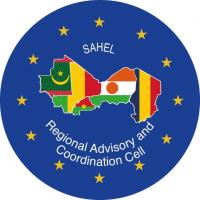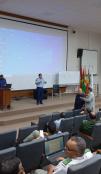Why training Chadian Police and Gendarmerie Officers helps strengthening societies in the Sahel

Fight against terrorism, organised crime and irregular migration is at the core of the G5 Sahel action and its Joint Force. Enhancing such capacity is also one of the main objectives of the RACC.
Nineteen Chadian law enforcement officers from different Units of the Police and the Gendarmerie, including the Special Investigation Department and the Central Office against Drug and Terrorism, including a woman, joined the course.
At the margin of the course activities, the Chadian law enforcement officers, said they refined their skills on topics such as Techniques of Surveillance and Tailing. They also improved the effectiveness of their operational methodology in terms of management of human resources, use of weapons and progression on the ground (e.g., how to position in relation to a target, the use of vehicles, communication tools and imagery collection).
A woman holding a senior position in the Central Office against Drug and Terrorism, Alphonsine Allahodoum believes that her ability to observe a suspect is definitively improved as she added learned additional techniques by her European colleagues.
Being the only female participant in the course, Alphonsine, feels proud for “representing Chadian women”. She says she is totally at ease among her male colleagues, in fact, she said, “I learned by then as they learned from me”. Alphonsine is convinced that female participation in such trainings and in her country security sector needs improvement. In order to progress towards gender equality at least a third of participants in the courses such as the one she joined should be women: “Only as such we can really make a difference in our society”, says Alphonsine.
The closing ceremony of the course was attended by the EU Ambassador to Chad, Kurt Cornelis, representatives of the concerned Internal Security Forces concerned (the General Directorate of the National Police et the General Directorate of the Gendarmerie), representatives of the French Embassy and of the EU Delegation to Chad.
Ambassador Cornelis underlined in his speech that security is first and foremost a service for the public and that is an essential function of the State, as improving security will eventually provide the conditions advance towards economic growth.
Mentioning the EU engagement in the Sahel in the field of security, stability and development, Ambassador Cornelis mentioned the essential role of the RACC for engaging with all the G5 Sahel countries, since a permanent deployment of EU Civilian Missions and Operation concerns Mali and Niger.
As the EU High Representative for Foreign Policy (HR/VP) Josep Borrell stated last January in his remarks about the EU engagement in the Sahel: “The populations (of the Sahel) have urgent needs in terms of security, of humanitarian aid and social and economic perspectives”, adding that “the primary responsibility” for providing responses to their citizens “remains with the authorities of the countries of the Sahel”.
And this is the very purpose of having RACC’s expert deployed in the field, side by side to their Sahelian counterparts.





